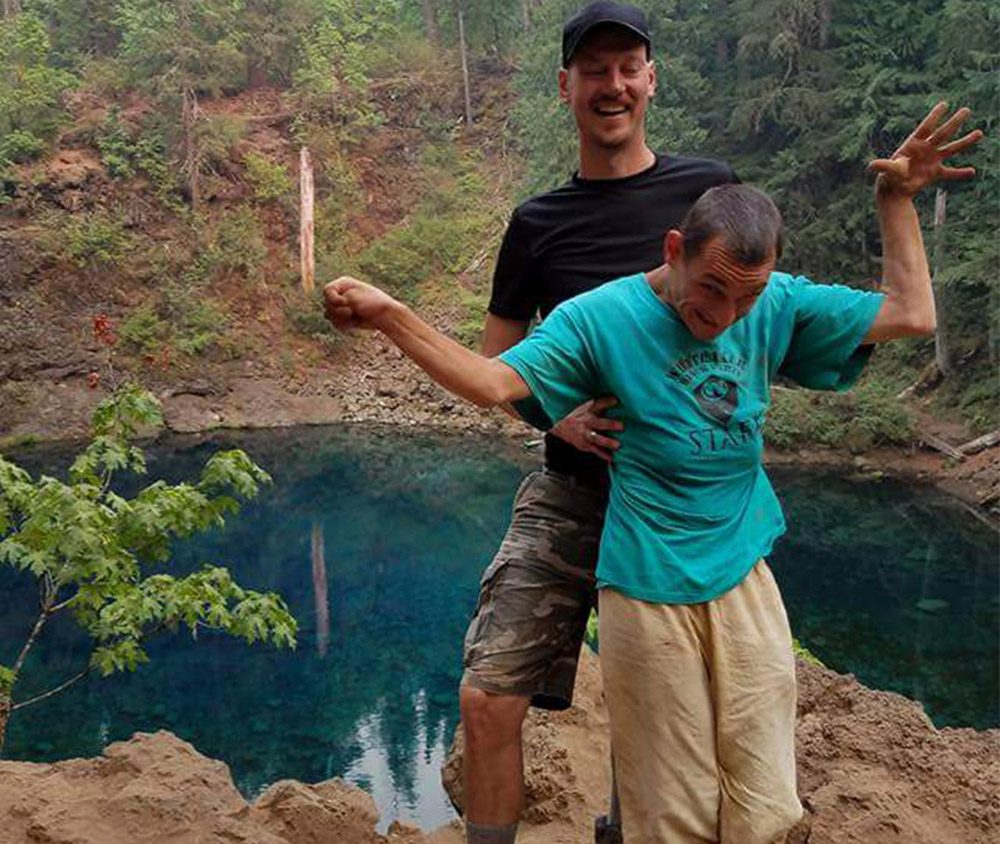Doug James loves to go hiking. His favorite part?
“The dogs,” James says, pointing to Havoc, a two-year-old boxer/pit bull mix that belongs to one of the hikers accompanying James on his hike up Skinner Butte.
James is a person with Down syndrome, a chromosomal disorder that happens when cells don’t divide properly, creating an extra 21st chromosome.
For people like James with disabilities, it’s sometimes much more challenging to take part in outdoor activities such as fishing, backpacking and horseback riding. Hiking trails considered easy for an able-bodied person could be much more difficult for someone with a physical disability. Not having enough time to prepare and travel also contributes, and the actual site itself can be a challenge if areas aren’t properly maintained.
As such, about 86 percent of people with disabilities cited their physical health as a barrier to going outdoors, according to a 2004 paper from the Journal of Park and Recreation Administration. For abled people, this rate drops to about 26 percent.
A Eugene nonprofit is hoping to change that.
“I think people with disabilities benefit way more immediately than we do” from nature, says Adam Storrs, director of The Misguided Project.
The Misguided Project seeks to help physically, emotionally and intellectually disabled people get out into the wilderness. It grew out of Storrs’ for-profit business, Misguided Outfitters, which works with customers to create custom wilderness expeditions.
Misguided Outfitters has done 17 trips so far, Storrs says.
And research suggests that outdoor recreation can benefit those with and without disabilities. According to a paper in the 2006 International Journal of Wilderness, which surveyed both abled and alter-abled people, 98.4 percent of respondents who went on trips to the wilderness reported that they could better develop personal relationships with others. About 70 percent reported that they had grown as a person afterward.
“One of the things that drove me to want to pursue this need is because I get out there for my own benefit,” says Storrs, who has post-traumatic stress disorder. “Reaching the veterans community is also one of the things we want to do. It’s in our purpose that we recognize disabilities to be emotional, mental and physical.”
During the hike up the butte, James joked with Elliot Morgan, a co-founder of both Misguided Outfitters and The Misguided Project. James nicknamed Morgan — a tall, mustached man — “Sasquatch.”
“Mental illness is one of those things that I think the woods has the best effect on,” says Morgan, who spent his childhood exploring the woods behind his backyard. “Being in the woods isn’t going to fix your broken hands, but it can definitely help your emotional and your mental stability.”
The Misguided Project chooses residents to take on expense-free trips based on nominations from community members. James is the first nominee and was nominated by his boss at Tim’s Trims Barbershop.
“The stresses that people with disabilities go through day-to-day really get relieved the moment they know that they’re going somewhere like that,” Storrs says.
Part of the reason why there are so few outdoor programs for people with disabilities is because the need isn’t as widely known.
Historically, outdoor recreational services have offered few to no options for people with disabilities. In the 1980s, the National Park Service created the Special Programs and Populations Branch to promote access to the outdoors, which was bolstered by the Americans with Disabilities Act of 1990 (ADA).
The term “misguided” comes from clients’ need to have a top-notch guide while still being free to explore, Storrs says.
“They want to feel very safe,” Storrs says. “But the ‘misguided’ term is kind of like: ‘Hey, relax.’”
James, Storrs, Morgan and two volunteers from the nonprofit hiked Skinner Butte as a stepping stone toward scaling Spencer Butte.
“I’d do it again now,” James said after finishing the hike up Skinner Butte.
Find out more at Misguided Outfitters, misguidedoutfitters.com.
